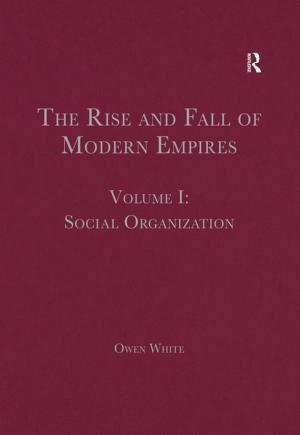Space Policy in Developing Countries
The Search for Security and Development on the Final Frontier
Nonfiction, History, Military, Aviation, Social & Cultural Studies, Political Science, International, International Relations| Author: | Robert C. Harding | ISBN: | 9781136257896 |
| Publisher: | Taylor and Francis | Publication: | September 10, 2012 |
| Imprint: | Routledge | Language: | English |
| Author: | Robert C. Harding |
| ISBN: | 9781136257896 |
| Publisher: | Taylor and Francis |
| Publication: | September 10, 2012 |
| Imprint: | Routledge |
| Language: | English |
This book analyses the rationale and history of space programs in countries of the developing world.
Space was at one time the sole domain of the wealthiest developed countries. However, the last couple of decades of the twentieth century and the first decade of the twenty-first century have witnessed the number of countries with state-supported space programs blossom. Today, no less than twenty-five developing states, including the rapidly emerging economic powers of Brazil (seventh-largest), China (second-largest), and India (fourth-largest), possess active national space programs with already proven independent launch capability or concrete plans to achieve it soon.
This work places these programs within the context of international relations theory and foreign policy analysis. The author categorizes each space program into tiers of development based not only on the level of technology utilised, but on how each fits within the country’s overall national security and/or development policies. The text also places these programs into an historical context, which enables the author to demonstrate the logical thread of continuity in the political rationale for space capabilities generally.
This book will be of much interest to students of space power and politics, development studies, strategic studies and international relations in general.
This book analyses the rationale and history of space programs in countries of the developing world.
Space was at one time the sole domain of the wealthiest developed countries. However, the last couple of decades of the twentieth century and the first decade of the twenty-first century have witnessed the number of countries with state-supported space programs blossom. Today, no less than twenty-five developing states, including the rapidly emerging economic powers of Brazil (seventh-largest), China (second-largest), and India (fourth-largest), possess active national space programs with already proven independent launch capability or concrete plans to achieve it soon.
This work places these programs within the context of international relations theory and foreign policy analysis. The author categorizes each space program into tiers of development based not only on the level of technology utilised, but on how each fits within the country’s overall national security and/or development policies. The text also places these programs into an historical context, which enables the author to demonstrate the logical thread of continuity in the political rationale for space capabilities generally.
This book will be of much interest to students of space power and politics, development studies, strategic studies and international relations in general.















